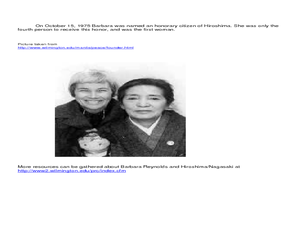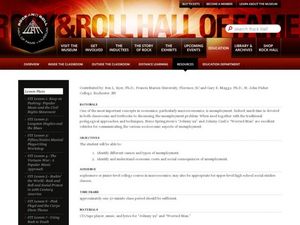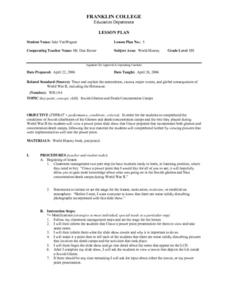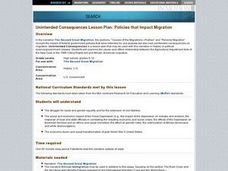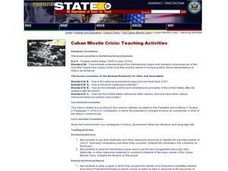Curated OER
A Peace Maker in the Aftermath of War
Students discover how Barbara Reynolds was involved with the atomic bomb in World War II. In this World War II atomic bomb lesson plan, students work in groups to research WWII. Students present their findings with pictures and discuss...
Curated OER
The History of the Holocaust From A Personal Perspective
Young scholars research and identify how Holocaust events affected lives of real people who lived in Europe from 1933 through 1945 and after, and create original artwork, poetry, and essays that reflect understanding of Holocaust, and...
Museum of Tolerance
Documents That Shape Society
The Bill of Rights is a foundational document of American democracy, much like the Nuremberg Laws were a foundational document of the Reichstag of Nazi Germany. But that's where their similarities end. Engage high schoolers in a...
Curated OER
The Ethics of the Bomb: What Would You Do?
Learners research the use of the atomic bomb in WWII, analyze the human costs of dropping the bomb and identify the pros and cons. They develop a PowerPoint presentation on the effects of an atomic bomb dropped on their hometown.
Curated OER
Lesson Plan on Korea
Students read a variety of novels and watch clips of films through which they begin to feel empathy for cultures and countries occupied by foreign countries. They have the option of studying the Sino-Japanese Wars or the Russo-Japanese...
Curated OER
Baby Boom and the Culture of the 1950's
Eleventh graders explain the causes, course, and consequences of the United States' role in World War II.
Curated OER
Teaching Economics and Rock and Roll: Unemployment
Students explore the consequences of unemployment. In this macroeconomics lesson, students listen to the songs “Johnny 99” and “Worried Man.” Students discuss the socioeconomic costs of unemployment as they analyze the songs.
Curated OER
History Repeats Itself
Twelfth graders research historical turning points, gather-data, and extrapolate possible alternate outcomes. They work individually to choose one historical event from Attachment D, Historical Turning Points. Students complete either...
Curated OER
Anne Frank: 'Everything Changed For Us'
Students discuss the rights that we take for granted, comparing them to the rights lost by the Jews under Hitler. They determine the types of discrimination that led to more acute persecution and explain the impact of majorities and...
Curated OER
Jewish Ghettos and Death/Concentration Camps
Students trace and explain the antecedents, causes, major events, and global consequences of World War II, including the Holocaust. They assess the conditions of Jewish inhabitants of the Ghettos and death/concentration camps and the...
Curated OER
Checks and Balances: Japanese-American Incarceration
Middle schoolers examine the three branches of the Federal Government and their decision to place Japanese-Americans in camps during World War II. They analyze debates made by leaders during this time period.
Curated OER
Noncombatancy and the Seventh day Adventist Church
Upper graders investigate how the Seventh Day Adventists are objectors to the practice of war. The lesson covers the Civil War and examines the church's position about the practice of war. The research extends to modern wars and learners...
Smithsonian Institution
Cuban Missile Crisis
The United States—specifically John F. Kennedy—played a large role during the Cuban Missile Crisis. A history resource poses questions that encourage critical thinking as well as in-depth analysis of images from the time period.
Curated OER
The Arms Race - From the Beginning to the End
Ninth graders focus on the political and technological developments of the Cold War. They, in groups, read and summarize the speech they are given. They should provide a short presentation based on their interpretation.
Teach With Movies
Title: "The Time Machine" - Topics: Science-Technology
Director George Pal’s film The Time Machine, based on H. G. Wells’ 1895 science fiction novella and starring Rod Taylor, Alan Young, and Yvette Mimieux, is the focus of a lesson plan that considers the consequences of time travel....
Curated OER
Making Sense of the Reformation in 1 Day
Ninth graders explore the events of the Protestant Reformation. in this religious denominations lesson, 9th graders use the provided graphic organizer to take notes on a PowerPoint presentation about the different beliefs withing...
Curated OER
Fighting Back
Students identify different methods of resistance used by Jews during the Holocaust and classify them as either passive or active forms of resistance. They create a role play of a husband and wife on whether they should hide a child of...
Curated OER
refugees From Vietnam and Cambodia
Tenth graders explore the massive immigration from Vietnam and Cambodia. In this World History lesson, 10th graders examine the crisis that led to this immigration. Students participate in a debate on whether the United States owes a...
Curated OER
Time Traveler Blues: The Great Depression
Students research the Great Depression Era and its effect on the world. They create a multimedia presentation over the Great Depression from many angles.
Curated OER
Unintended Consequences: Policies that Impact Migration
Students examine the cause-and-effect relationship between the Agricultural Adjustment Acts of the New Deal or the 1965 Voting Rights Act and African-American migration. They write an essay evaluating the effectiveness of the Voting...
Curated OER
Cuban Missile Crisis: Teaching Activities
Learners create a timeline of the important events of John F. Kennedy's presidency. They construct a timeline of the major events of the Cuban Missile Crisis. They compare the Missile Crisis events with their presentation in the movie...
Curated OER
The Role of the United Nations in Postwar Iraq
Students study the history of the United Nations and answer study questions regarding the role of the UN in present day post-war Iraq.
NASA
Einstein and His Times
Scholars research and present on the historical happenings of 1919. After sharing their findings, pupils debate about how Congress dealt with the moral issues of the time. The evaluation asks learners to write a persuasive essay...
John F. Kennedy Presidential Library & Museum
Analyzing the Inaugural Address
Get high school historians to step outside their own shoes by responding to JFK's inaugural address from the perspective of a civil rights activist, a soviet diplomat, or a Cuban exile. After a class discussion about the address, the...


